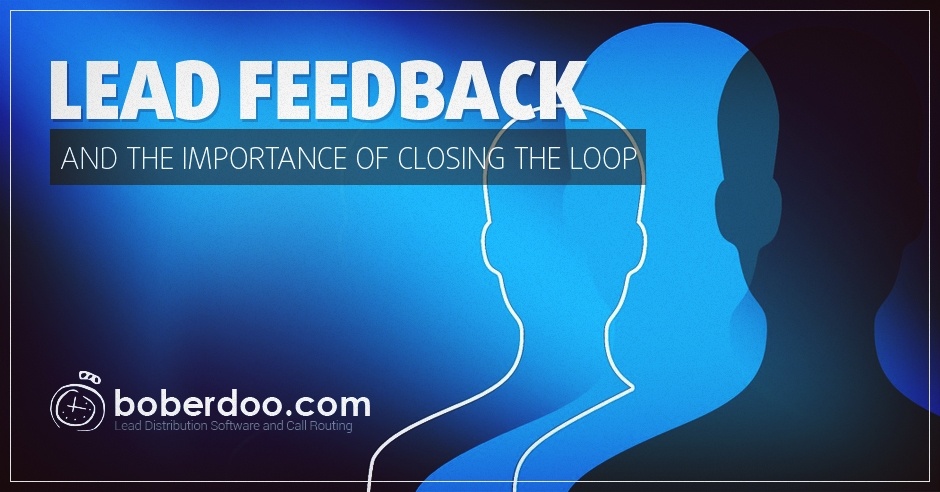For lead generators, getting lead feedback is hard. Getting feedback from your buyers can be cumbersome. How much information can you get from your a buyer that you sell 100 leads to every day? They're already paying you for every lead. Feedback from the leads themselves can be tricky. How do you drive the lead back to a questionnaire? Will they even understand that you generated the lead, but your buyer was the one who called them?
However, getting lead feedback is extremely important, not just for piece of mind, but for the fluidity and optimization of your lead business.

The Importance of Lead Feedback
Irrational lead pricing always amazes me. Why is a lead being priced at $15 in one lead company’s system and the same exact lead being priced at $25 in another? There are a lot of boberdoo clients that sell to one another so this is something we witness quite often.
The most humorous occurrence was around ten years ago. A boberdoo client was buying and selling payday leads to a large aggregator (not a boberdoo client). Payday leads sell differently than leads in other verticals. A waterfall system is used where you send a lead first to the highest (normally fixed) price bidder and wait to see if they accept the lead or not. If not, you move down the waterfall and try to sell it to somebody else, then somebody else, and so on until the lead is sold or you run out of matches.
I personally think this is an awful methodology, bad for the consumer, and the industry needs to change but I will save that song for another time.
The boberdoo client was buying payday leads from this aggregator at several different price points, or tiers, and was also selling leads to the aggregator at several different tiers. One day I noticed that the client had accidentally set up this aggregator’s buying filter to accept leads from that same aggregator’s source.
Without even realizing it, our client was buying leads from the aggregator at $10 and selling those same leads back to the same aggregator at $30. We talked about it and the reaction was, “Huh, that’s funny. I wonder how long this will last.” If my memory serves me right it lasted for a couple months to the tune of about $5K a day in profit.
Ok, so clearly you should not be selling somebody a lead at $10 and then buying it back at $30. Strangely enough, with the mixed-up ways that aggregators connect sources and tiers, this was still probably profitable for them. In terms of lacking visibility into what is going on in the aggregator’s system, this is about as bad as it can be.

Other than for humor’s sake, let’s disregard this example and focus on something more sustainable. I believe logical pricing can only be formulated if you close the feedback loop. Going one step further, I believe that you should get feedback from the lead buyer and comments from the lead.
Lead Feedback From Your Buyers
We have seen clients try to get feedback from their lead buyers. This seems to be a real struggle where a lot of buyers will say yeah sure, but then not take the time to do it. It is a very easy argument to make. If the lead buyer can tell the lead seller which leads they contacted, which closed, which did not, etc., then the lead seller can back that out and dig into where those leads originated.
Which keywords performed best on the SEM leads? For all leads from source X, which sub id is producing great leads (and obviously which sub id’s should get blocked because none of their leads are good)? For which pings should you raise your bid? If you have a boberdoo system and you can convince your buyers to set the lead status on each lead, great. If the buyers have their own CRM and they are willing to export results as Excel files and send them to you, so be it.
This is important and worth the time. You may be successfully selling leads to a buyer right now but unless you fine-tune your lead generation to make sure the leads you send are good, sooner or later you may lose that client.
Lead Feedback From The Leads Themselves
Getting feedback from your leads is just as important if not more so. In theory, the lead should be telling the same story about what happened at the end.
Did the lead talk with the lead buyer? Are they moving forward with the lead buyer? There are a lot more answers you might be able to get out of that lead though. How many times did the buyer call you? Did you get any emails? If so, how many? Was the lead buyer courteous? Was the offer presented reasonable or did it seem like the lead buyer was dishonest?

You do not have to ask all the questions to every single lead. One strategy is to ask one or two questions to random leads that went to the same lead buyer to get the full story. Maybe the buyer’s sales skills are lacking and you can help them out. Was the buyer is too aggressive and the lead did not have a good experience? Maybe you find out the buyer is trying to pull a scam on your leads and you need to shut them off immediately. If you are generating your own leads, building this relationship with the lead is in your long-term interest.
Long story short here is that pricing is not uniform but if you want to try and at least make it rational, you need to understand where your good leads are coming from and where they are not. The only way to do that is to close the lead feedback loop and ideally that is done from both the lead and lead buyer perspectives.
